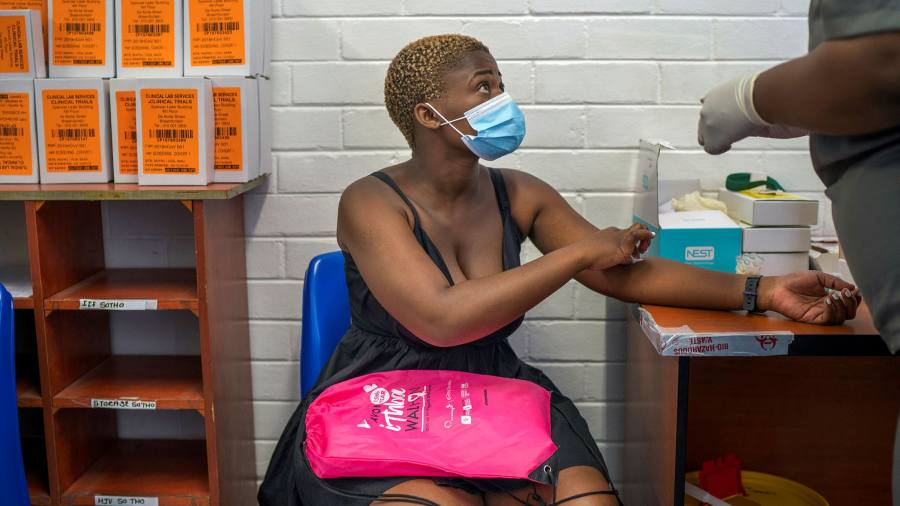[ad_1]
Countries where the Covid-19 variant first identified in South Africa is dominant are receiving conflicting advice about whether to roll out the Oxford/AstraZeneca vaccine in a sign of the complex challenge facing public health officials.
John Nkengasong, director of the Africa Centres for Disease Control and Prevention, said preliminary evidence that the Oxford/AstraZeneca jab might not stop mild and moderate disease linked to the 501.V2 variant meant countries where it was circulating widely should seek alternatives.
“If you have evidence that the 501.V2 variant is dominant . . . in your country, then we recommend that it should not be deployed for the obvious reason that it will have reduced activities in neutralising antibodies,†Nkengasong said at a briefing on Thursday.
The advice appeared to conflict with recommendations from the World Health Organization, which endorsed the Oxford/AstraZeneca shot on Wednesday for use in all countries, including those where 501.V2 was present.
Dr Matshidiso Moeti, the WHO regional director for Africa, echoed the advice on Thursday. “If this virus [variant] is not circulating very widely — and even if it is — we are recommending the use of the vaccine with an understanding that it may not be able to stop some cases, particularly mild cases, but it is able to stop severe cases.â€
Moeti described the seeming difference in recommendations between the WHO and Africa CDC as small. Given the surge in infections, she said, it was important to use whatever tools were available to keep people out of hospital, particularly given shortages of oxygen.
Many African countries have struggled to access vaccine doses and were depending on supplies of the Oxford/AstraZeneca jab to begin innoculations. But the debate about the 501.V2 variant and vaccine efficacy has led to uncertainty.
Eswatini, the kingdom formerly known as Swaziland, said this week it would not use the Oxford/AstraZeneca vaccine, but would look for alternatives. “The country has considered its close proximity with South Africa. We felt that the variant could be in the country already,†said Lizzie Nkosi, the health minister. “We will no longer be using the AstraZeneca-Oxford vaccine.â€
South Africa has already halted the rollout of the Oxford/AstraZeneca vaccine, which had been due to begin this month. Instead, it is hoping to start vaccinations shortly with Johnson & Johnson’s one-dose shot and the BioNTech/Pfizer jab. Zweli Mkhize, the country’s health minister, said Pretoria was exploring the possibility of swapping or selling the Oxford/AstraZeneca doses it already had.
Some experts have questioned South Africa’s decision to stop using the vaccine, arguing that it could still prevent deaths and is the jab most immediately available.
Moeti said that even South Africa would most likely continue to use the Oxford/AstraZeneca vaccine on a trial basis in older healthcare workers to try to determine its efficacy against serious disease. “This is one of the vaccines that are best adapted to the context of an African country,†she said. Moeti added that her office would talk to South Africa’s neighbours, including Eswatini, to discuss the risks and benefits of using the vaccine and to make its recommendation known.
Nkengasong agreed that countries that had picked up only sporadic cases of 501.V2 should still deploy the Oxford/AstraZeneca vaccine.
Covax, the WHO-led vaccine facility, is hoping to supply African countries with millions of doses of the jab this month. About 500m of the 670m vaccine doses ordered by the African Union also come from Oxford/AstraZeneca via the Serum Institute of India, making it what Nkengasong called “the backbone of the vaccine strategy†in Africa.
He urged all countries to step up their testing for variants. Only thorough epidemiological studies could inform robust decision-making, he said.
Dr Daniel Ngamije, Rwanda’s health minister, said he was expecting the first batch of an order for 996,000 doses of the Oxford/AstraZeneca vaccine to arrive in the next few days, along with some doses of the BioNTech/Pfizer vaccine. He said his government would follow WHO recommendations.
[ad_2]
Source link





